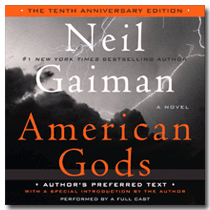 Turning the last page of a book I enjoyed is always a sad moment for me. A moment ago I walked in another world, observed the lives of others, felt and hoped with them and a second later I am alone stranded in my own reality with my own thoughts. Five minutes ago I have finished American Gods by Neil Gaiman and I feel like I just said goodbye to a good friend. I did not read it, I listened to it. It was the 10th Anniversary Edition full cast audiobook. Over 19 hours and 39 minutes, it had been my companion. It was not an easy start but it grew on me fast and now it had left me.
Turning the last page of a book I enjoyed is always a sad moment for me. A moment ago I walked in another world, observed the lives of others, felt and hoped with them and a second later I am alone stranded in my own reality with my own thoughts. Five minutes ago I have finished American Gods by Neil Gaiman and I feel like I just said goodbye to a good friend. I did not read it, I listened to it. It was the 10th Anniversary Edition full cast audiobook. Over 19 hours and 39 minutes, it had been my companion. It was not an easy start but it grew on me fast and now it had left me.
It went with me everywhere, on my way to work, to pick up my kids, entertained me when I cleaned the kitchen or sorted my mail. But now it is gone at least for a while.
You see, it’s not a small book. As it is with good books, they are better when they are big. Sometimes they are also hard. Especially when you actually read them. The Last Stand in its 1168-page original uncut version was one of those books. So hard to read, but so good at the same time. It accompanied me for quite a while. After I finished it, it looked like I have read it many times. I kind of did, I guess. I can still feel the void it left when I was done.
A good novel always leaves me inspired and motivated to fill this void one way or the other.
Those good, big books change you. They will never leave you again. They don’t have to be lengthy to leave an impact, it’s just more fun if they are. A Prayer for Owen Meany by John Irving will never leave me either. And, of course, books like 1984 (George Orwell, 260-280 pages) or Brave New World (Aldous Huxley, 180-280 pages) are so burnt into my memory that feelings of déjà vu and remembrance are triggered as I look at the world today.
Although, they are works of fiction we should and cannot dismiss their importance. When I hear a seven-grade teacher at my son’s back to school night beg us parents to please push our kids towards more informational texts in their spare time and have them move away from novels and see all parents nod in affirmation then I am glad to have been the minority of one in this room.
Yes, reading is important – YOU are reading these lines after all – but so is how and what you read. Reading should be fun, it should boggle your mind, it should transport you to places you’ve never been, make you be someone else, it should make you disagree, squirm, laugh and yes it should frighten you at times. It should give you a break from your reality and make you dream up and imagine new realities.
Because the truth behind all non-fiction books is that they also describe only one of many realities. They tell you the version of reality the author sees. Good authors always emphasize this fact but too many readers take what they read as the only truth. To be clear, this is is no fiction versus non-fiction argument, one can’t be without the other just as there is no food versus drink. I believe you need both. There is no invention without creativity just as there is no improvement without imagination.
So, don’t feel bad for reading fiction. Go, read and leave this world in your mind just for a little bit. It’ll be worth the trip.